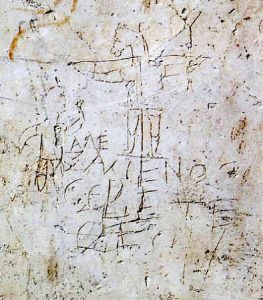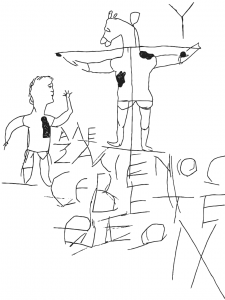Nerys writes: This week’s dreadful news stories from Afghanistan, Haiti and Plymouth have reminded us of our helplessness in the face of evil, injustice and natural disaster. There is so little we can do, but we can turn to our God of compassion who is there in the midst of the suffering and is also here with us. As you light your candle and prepare yourself for worship today, pray that God’s light of love would transform the hearts and minds of those who are spreading darkness in our world, bring hope to those who are living in fear and in need and use us as vehicles of her peace.
Today we come to the last part of the sixth chapter of John’s Gospel which we’ve been reading for the last five weeks. It started with the feeding of the five thousand and finishes with Jesus teaching in the synagogue in Capernaum using the image of the living bread to explain who he is. Our Gospel reading is John 6.56-69.
When I first read this passage, what came to my mind was this image of a piece of graffiti I saw when I visited Rome many years ago. It was scratched on the wall of a schoolroom on Palatine Hill sometime in the late second century.

It shows a man on a cross and a boy who seems to be raising his hand in worship. The victim has the head of a donkey. Underneath, the schoolboy artist has scrawled in rather dodgy Greek ‘Alexamenos worships [his] god’.

Hi classmates would probably have thought that young Alexamenos deserved this insulting joke. To outsiders, the early Christians were stupid fools. The Greek satirist Lucian called them ‘misguided creatures’. That they were foolish was the main claim of Celsus, the first author who wrote against Christianity. And Paul, writing his letters about the same time, doesn’t deny it, saying, ‘We preach Christ crucified, to Jews a stumbling block and to Gentiles foolishness’.
Jesus claims that his words are ‘spirit and life’ but his talk of his followers needing to eat his flesh and drink his blood in order to receive that life is deliberately shocking. These words are disturbing for us today. They would have been anathema to any Jew and were hotly debated in synagogues across the Mediterranean during the second half of the first century. In our Gospel passage, they cause many of his followers to leave him, saying, ‘This teaching is too difficult, Who can accept it?’ Jesus then turns to his remaining disciples and gives them a choice, ‘Do you also wish to go away?’
In our Old Testament passage, Joshua 24.1-2a, 14-18, Joshua also gives his listeners a choice. On the threshold of entering the Promised Land and making their home there, he calls the people of Israel together to make a decision. Will they serve the Lord who had rescued them from slavery in Egypt and led them through the wilderness, who had been present with them in their suffering and in their joy, or the ancestral gods of the land of Canaan, the gods of the past who offered security, safety and comfort?
Some scholars think that the story of the giving and making of this choice was a rite, a kind of liturgical drama, re-enacted by subsequent generations on many occasions. It would have spoken very powerfully to readers in exile in Babylon, for example, those choosing to keep their costly promise to worship God alone in a foreign land.
Joshua offers the children of Israel this choice without any judgement, making his own profession of faith clear but offering them legitimate alternatives. Jesus in our Gospel passage also gives his followers a similar free choice between the security, safety and comfort of religion with its tidy rules and rituals, and a costly commitment to a way of life that demands a leap of faith and will be ridiculed by many.
Peter answers on behalf of the remaining few: ‘To whom else shall we go? You have the words of eternal life.’ There are other gods which we can worship on our own terms, but none that lead us to a way of living and loving that deprives fear and death of the upper hand. Christ, the Holy One of God, offers us a free choice. Peter will go on to deny Jesus and desert him in his hour of need, only to recommit to following him on the beach after the resurrection. The people of God were called by the prophets to return to the Lord over and over again. Wrestling with faith doesn’t mean being judged and found wanting by God. The offer to follow Jesus remains open throughout our lives.
In a nearby room in that former school on the Palatine Hill is another graffito by a different hand. It says, ‘Alexamenos is faithful’. Alexamenos despite the mockery of his classmates, chose to worship Christ, the crucified and resurrected God, whose teaching was foolishness to the worldly wise. Will we, like him and like Peter continue to make the same choice?

To finish, you may choose to reflect on this image by an unknown artist and on these words from Philippians 2.6-11 and then read them out loud as an affirmation of your faith in Christ.
Though he was divine,
He did not cling to equality with God
but made himself nothing.
Taking the form of a slave,
He was born in human likeness.
He humbled himself
and was obedient to death,
even the death of the cross.
Therefore, God has raised him on high,
and given him the name above every name:
that at the name of Jesus
every knee should bow,
and every voice proclaim that Jesus Christ is Lord,
to the Glory of God the Father. Amen.






